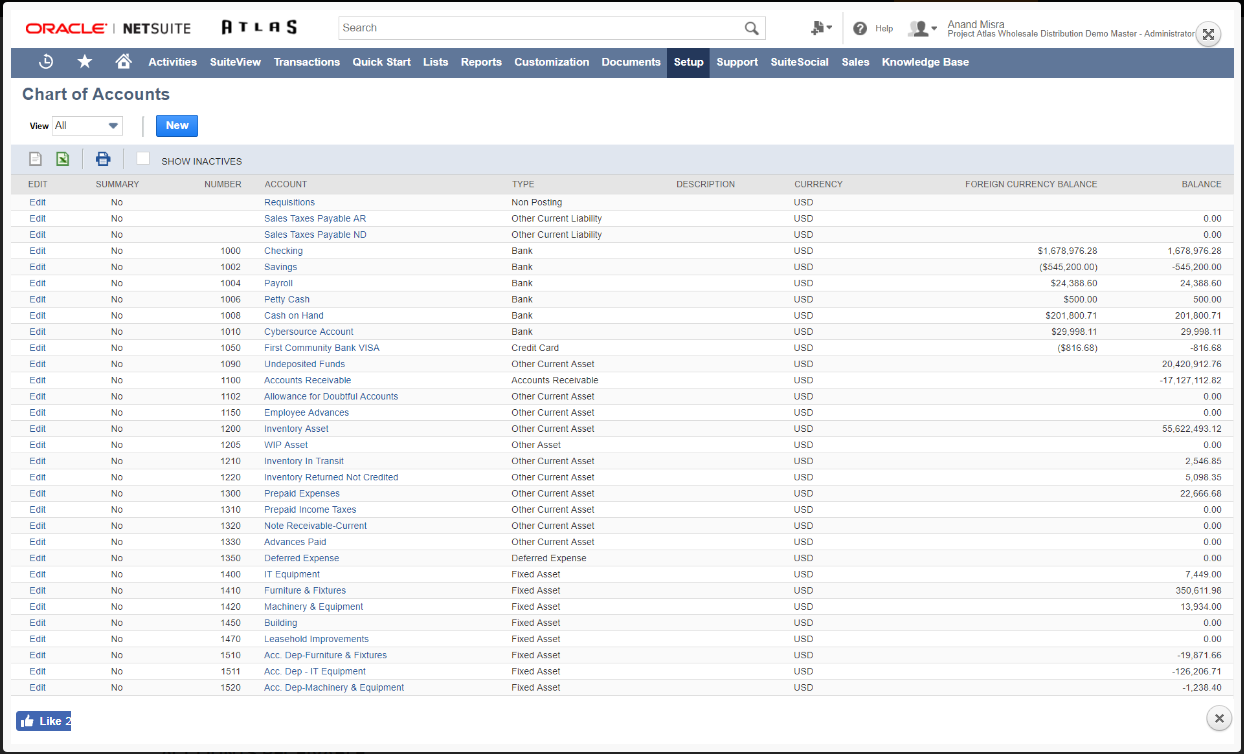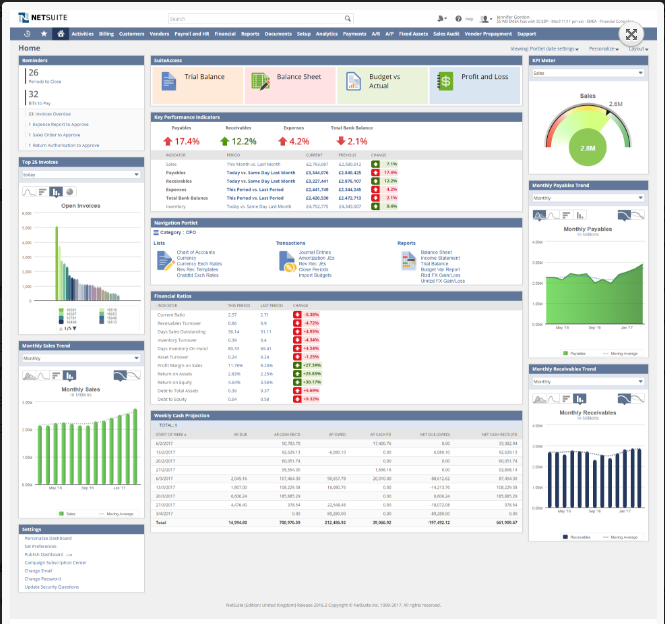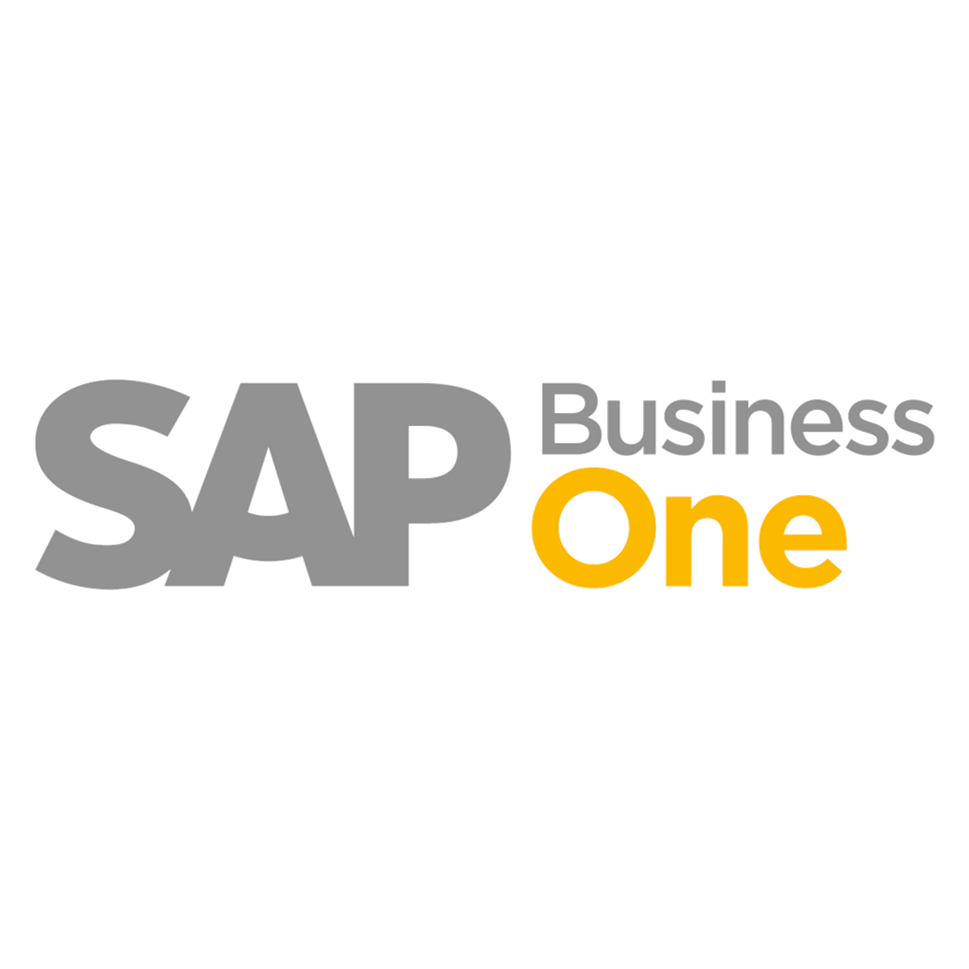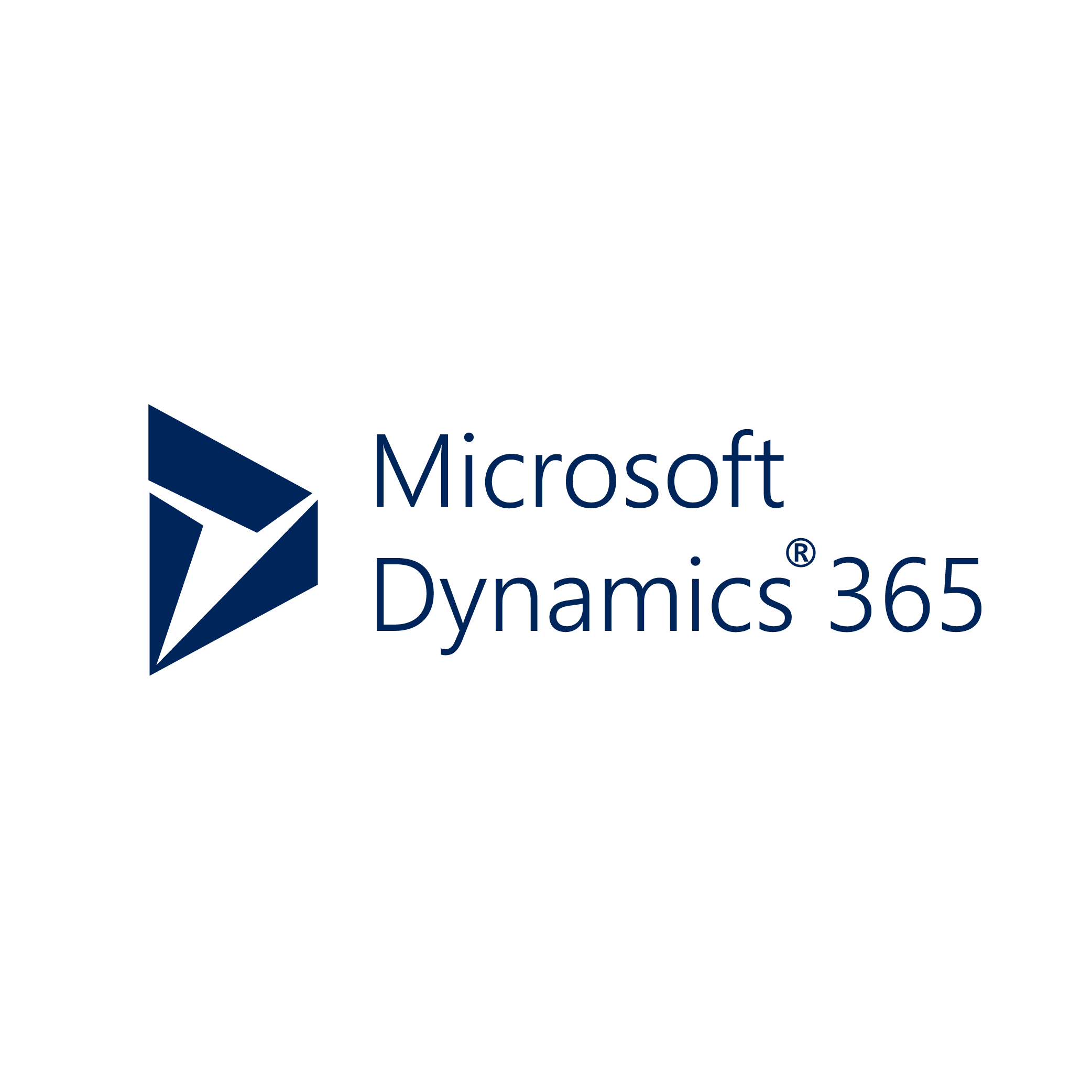
Vendor:
Founded:
Headquarters:
Oracle
1977
Austin, TX
Customers:
Deployment Model:
Free Trial:
430,000+
Cloud
Yes
NetSuite ERP At A Glance
Product Overview
NetSuite is a cloud-based ERP software from Oracle that allows companies to streamline business processes and scale fast-growing business. NetSuite integrates and automates key functional areas like financial management, revenue management, inventory management, order management, billing, e-commerce, and CRM.
Features
NetSuite comprises seven inter-related modules, each of which draws data from a shared database. This interconnectivity affords users module-specific features, covered below.
The Financial Management module offers users real-time access to live financial data and direct links between accounting and compliance management. Users can expect to get accelerated closings, accurate reporting and real-time data from these features:
- Finance and Accounting – This tool combines core accounting functions with real-time financial visibility and business insights to drive financial progress.
- Billing – Users can integrate sales, finance and fulfillment for seamless processing with this module.
- Revenue Recognition – This helps with compliance and scheduling.
- Financial Planning and Reporting – This let’s users integrate planning, budgeting and forecasting, rendering real-time, on-demand, decision-making data.
- Global Accounting – This features affords “close-to-disclose” capabilities, and supports international compliance and regulations, accelerating closings.
- Governance, Risk and Compliance – Via technology and automated processes, this tool addresses regulatory and risk issues.
Order Management solutions improve cash flow, enhance on-time delivery, reduce shipping costs and integrate with CRM. Its features include:
- Pricing and Promotions – This feature handles multiple price levels, customer and currency specific pricing, dollar and percentage discounts, promotion codes and transaction level gross profit analysis.
- Sales Order and Returns Management – User can access a dashboard which visualizes the process of taking, approving, scheduling, tracking, fulfilling, getting paid and handling returns.

How Much Does An ERP System Cost?
Download our free report to find pricing info on 12 popular ERP Systems including NetSuite, SAP, Microsoft, and Odoo.Download Now
The Production Management module lets users manage global manufacturing operations, render manufacturing location irrelevant, increase on-time delivery and reduce quality cost. Its features are:
- Product data management – This collaborative platform makes research, development and design information available through a self-service tool across teams.
- Work order management – This feature puts configuration control, including automatic batch creation, full traceability, production control and scheduling, into users hands.
- Planning and scheduling – Lets users plan material purchases, position inventory, and schedule employees, machines and work centers to assure on-time delivery.
- Quality assurance – Lets users define QA tests, set parameters to evaluate results, and apply results to relevant items and operations for receiving and in-process testing.
- MES – This is a barcode scanner-based interface with interactive tablet app that renders production facility information.
The Supply Chain Management solution affords real-time visibility, increases service levels and decreases costs. These benefits are found with the following features:
- Planning – This feature offers advanced inventory management and “demand planning” techniques work to improve on-time delivery metrics.
- Execution – A communication platform between distributors, partners, suppliers and contract manufacturers helps manage a supply chain.
- Collaboration – This tool aids automatic and instant contact via email, portal access to supply chain partners, and integrated system communication through web service or RESTlet APIs.
- Support – This case management system helps enter, route, escalate and resolve customer support issues.
Warehouse and Order Fulfillment module provides native, embedded solution options, real-time updates and support for Global business. Features include:
- Inbound and outbound logistics – Accessible dashboards manage automated I/O processes, including expediting outstanding orders, container management, scheduling specific receipt dates, monitoring material flows, performing quality checks and more.
- Inventory management – This tool ensures sufficient inventory through automated inventory tracking in multiple locations, safety stock, reorder points, cycle counts, demand planning and distribution requirements planning.
- Warehouse management system – This platform streamlines operations through mobile RF barcode scanning, putaway and picking strategy definition, task management, returns authorization receipt, cycle count plans and more.
Features associated with the Procurement module let users streamline procure to pay, achieve cost certainty and improve quality. They include:
- Source – With or without a work order and configured one of three ways, manufacturing can be fulfilled with automatic batch creation, full traceability, production control and scheduling.
- Purchase – User-definable workflows control the flow and approval of requisition to purchase.
- Pay – This graphical workflow tool can be configured to automate receipt of ordered items, process vendor bills and plan payments.
SuitePeople is the Human Capital Management platform that integrates as part of NetSuite’s ERP. With it, HR administrators can streamline employee information, new hires, employee onboarding, payroll and more. Its features include:
- Core HR functionality – Effective-dated employee master data drives native organization design, job and position management, workflows and compliance management.
- Payroll – Integrated with accounting, this module manages multi-jurisdiction taxes and benefit & deductions.
- Employee Center – Accessible dashboard displays usage and status of employee benefits, visibility into the organization’s hierarchy and access to vital information.
- Analytics – Accessible dashboard visualizes head count, company’s growth and turnover trends, segmented by departments, locations, employee class and subsidiaries, and other filters.
Target Market
Considered the most popular ERP software for mid-sized businesses, NetSuite targets its platform at businesses of all sizes. It also markets directly to CEOs, CIOs, CFOs and controllers, and targets companies running the following software (because NetSuite integrates with each):
- QuickBooks
- Microsoft Dynamics GP
- Sage
- SAP
- Deltek
- Epicor
- Legacy On-Premise ERP
- EPEC Engineered Technologies
- Land o' Lakes
- Williams Sonoma
- Shaw Industries
- LOVESAC
- iAutomation
- Commvault
- DocuSign
- Kronos
- The Boston Globe
Free Report: ERP Buyer's Guide
 Choosing an ERP Solution is all about finding the right fit. Our report will walk you through the process and help you make a smart purchasing decision. Download Now
Choosing an ERP Solution is all about finding the right fit. Our report will walk you through the process and help you make a smart purchasing decision. Download Now
Implementation/Integration
The breadth of a NetSuite install will determine the amount of time needed to fully implement a system. With that said, it’s reasonable to expect a window of anywhere from two to six months for the entire implementation.
Once a contract is signed, NetSuite dispatches its Success Services team. This suite of services is led by an Experience Manager, who collaborates with you to identify key issues, determine business goals and recognize opportunities surrounding your system setup. This planning between NetSuite and a customer leads to the development of a project road map.
Customers can also subscribe to NetSuite’s Technical Account Management (TAM), a paid premium service that ensures customers are successful in solving technical challenges during and after implementation.
Customer Service & Support
NetSuite offers a full array of support from standard help desk ticketing to do-it-yourself training courses.
It maintains two levels of support: Basic and Premium.
Every customer qualifies for Basic Support with any NetSuite subscription. Basic Support includes:
- NetSuite’s SuiteAnswers Customer Access Portal for logging product issues online through a ticket system
- Access to NetSuite Support User Group
- Online case submission
- 2 authorized support contacts
- 24/7 critical access
- 10 hours of daily online support, customer local time (8:00 a.m. to 6:00 p.m.) Monday through Friday, excluding holidays
Subscribers to NetSuite’s Premium Support qualify for 24/7 services for high severity issues, as well as:
- Access to NetSuite’s Toll-free Technical Center for 24/7 severity 1 & 2 issues
- Call routing by product area
- Severity prioritization with online case responses
- 4 authorized support contacts
- 24/7 non-critical access
- Weekend coverage
- Early notification of new releases
A third level of support beyond Premium is available. Premium Support customers can leverage NetSuite’s Advanced Customer Support (ACS) as a managed service that proactively optimizes their NetSuite solution. A designated customer success manager pilots a dedicated solution team in ACS that addresses three tiers of ACS support – Monitor, Optimize and Architect.
Oracle also offers a series of Professional Services for fee-based, one-off custom services for particularly unique issues.
Furthermore, a full curriculum of training classes is available. These courses can earn participants NASBA-endorsed Continuing Professional Education (CPE) credits.
Pricing
NetSuite’s price is tailored to each customer, predicated on a set of givens, including ERP configuration, required add-on modules, total user count and contract length. Its base license costs $999 per month with access costs of $99 per user, per month.
The NetSuite license operates as a subscription model and may be renewed annually or over longer intervals. Several prebundled vertical editions of NetSuite are also available, which can be useful in quickly identifying the package and modules that would satisfy a customer’s needs.
We cover more of NetSuite’s pricing along with possible alternatives depending on your company size. We’ve also covered costs in our 2021 ERP pricing guide.

How Much Does an ERP System Cost?
Download our free report to compare pricing on 12 popular ERP Systems including NetSuite, SAP, Microsoft, and Odoo.Download NowShortcomings
For companies that need it, NetSuite does not offer an on-premise version.
The numerous integrations, while helpful, can become problematic and lead to downtime if updates with the third-party software are not maintained.
Some users report poor performance with modules that were not developed in-house by NetSuite.
Screenshots
About
Oracle NetSuite is credited with being the first company to internet-deliver business applications. Its incipient SaaS has evolved over two decades into a suite of cloud-based financial/ERP, HR and omnichannel commerce software that can be found in thousands of businesses across the globe.
Download Comparison Guide




